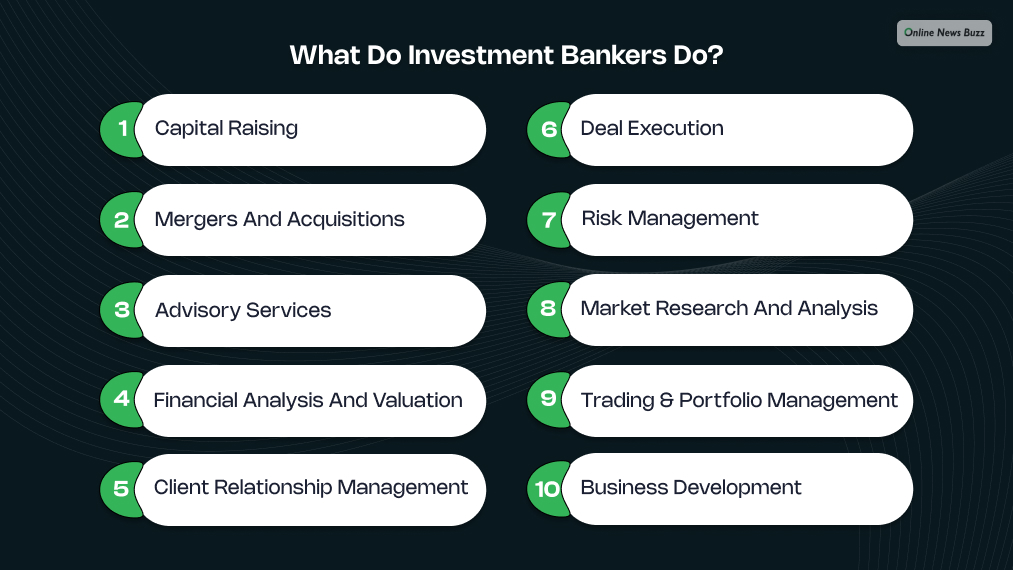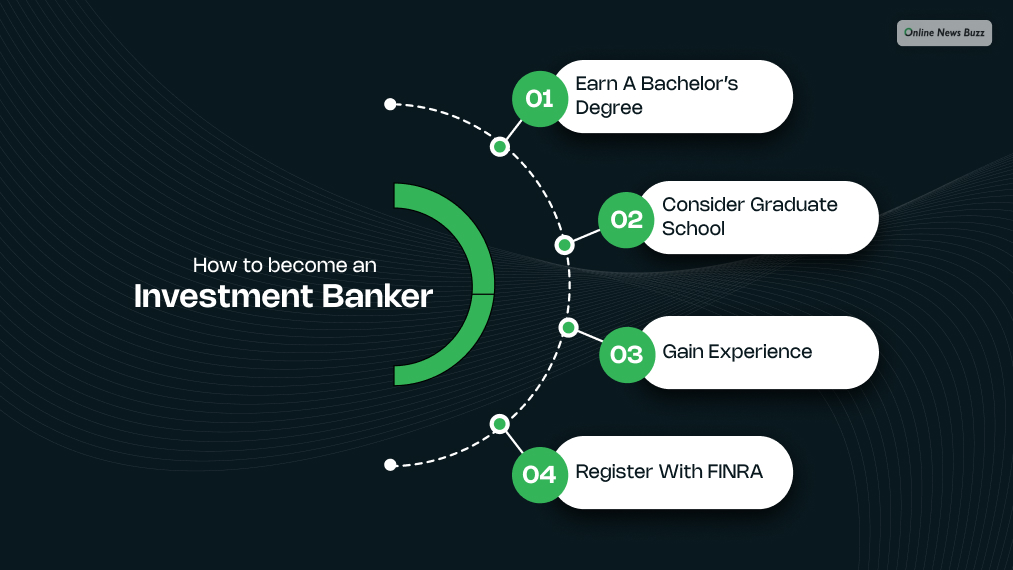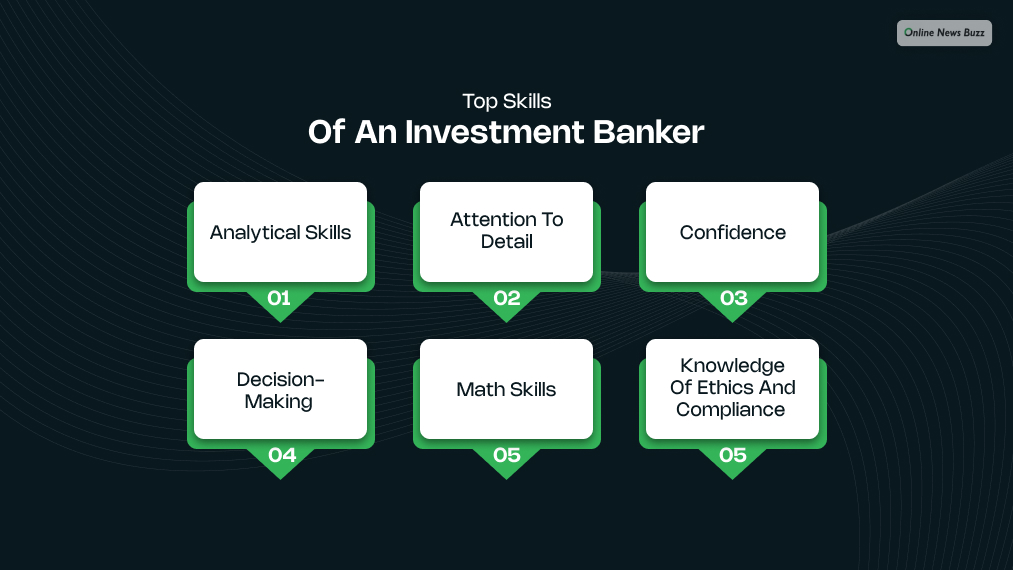
If you check any kind of small or medium business or even a big one that has made its presence known in the market for a while, they have one thing in common. They have worked with an investment banker to get where they are and to make their dreams come true.
Investment bankers are the major layers who work behind the screen to bring a company to the stock market. Investment banking is the bridge connecting financial markets, businesses, and investors.
So, if you are thinking about how to become an investment banker and know what they do, you have landed on the right page. Investment bankers are the ones helping their clients increase revenues, facilitate IPOs, balance the books, and get growth opportunities.
What is an investment banker?

An investment banker is a trained professional who provides various financial services to organizations, individual investors, and the government. They help companies get loans, set security prices, issue bonds and stocks, allocate resources, negotiate mergers, manage investments, and raise stock capital.
Investment bankers are the connection between investment and public or private companies. They offer financial consultation and advice about the kind of securities like bonds and stocks that they should issue. They tell you when and how to issue them and what price you should set for them.
Various investment bankers help and advise investors about the services and what kind of securities they should buy. A few of them also assist their clients with acquisitions and mergers and underwriting municipal bonds.
What do investment bankers do?

Before getting into how to become an investment banker, it is important to know what you are getting yourself into. They have huge responsibilities and job roles in their field. Some of the key functions include:
Capital raising
Investment bankers help governments, organizations, and other institutions raise their capital by issuing bonds, stocks, or other securities in the capital market. They help clients choose the best financial option they have and help them formulate the offering to get investors.
Mergers and acquisitions
They play a very important role in M&A transactions. They give strategic advice to those clients who are looking to sell or buy a company, conduct due diligence, facilitate negotiations, and also build the financial side of the deal. Moreover, they help assess probable alliances and evaluate companies.
Advisory services
Investment bankers provide strategic and financial guidance to their clients and give advisory services on different matters. This includes evaluating expansion strategies, assessing upcoming business opportunities, developing financial models, and analyzing market trends.
Financial analysis and valuation

They run extensive financial analyses to evaluate investments and companies. They check market trends, financial statements, industry conditions, and some other factors to check the value and the potential risks of the investments that you are thinking of making.
Client relationship management
They build and maintain healthy relationships with clients, including corporations, individual investors, and institutions. They meet the needs of their clients and give them personal advice and financial solutions depending on that.
Deal execution
Investment bankers manage and coordinate financial transactions. This includes working with different stakeholders, regulatory authorities, internal departments, and legal teams to make sure the deals are done smoothly and completed on time.
Risk management

Bankers assess risks related to financial transactions and manage them. They analyze credit risks, market risks, and any other kinds of vulnerabilities to help their client reduce risks and make informed decisions.
Market research and analysis
The bankers are always updated on market trends, industry developments, and economic indicators. They do their research and analyze everything to give necessary recommendations and insights to clients about portfolio strategies, market timing, and investment opportunities.
Trading and portfolio management
Few of the investment bankers are involved in trading activities on behalf of the institutions and clients. They handle the portfolios, recommend investments, and keep an eye on the market performance to optimize returns.
Business development
Investment bankers actively look for new business opportunities and for some potential clients. They are good at networking, attending different kinds of industry events, and pitching what they do to generate leads. They also focus on expanding their client base.
How to become an investment banker?

How to become an investment banker? What do you think it takes? The process requires several years of schooling and learning, getting a license, and gathering enough experience on the job.
Earn a Bachelor’s degree
To begin with, you need a bachelor’s degree, preferably in statistics, finance, or business administration. It takes four long years of full-time study. You can also opt for an internship during this time to get some experience in the field.
Consider Graduate School
Investment bankers go for their graduate degrees after completing their bachelor’s. They earn an M.B.A., which mainly leads to a high-level position and also gives them a chance to increase their salaries.
Gain Experience
Various investment bankers get job training, including going to conferences and attending training seminars.
Register With FINRA
Every investment banker must get a license from FINRA or the Financial Industry Regulatory Authority. This license gives you the right to sell investment services and products. You have to pass a set of examinations to get this license. After getting the license, a banker can continue with their services according to industry standards.
How much does an Investment Banker make?
The average base salary of an investment banker is around $116,180, according to the Payscale data released in June 2024. However, the total compensation is higher when the bonus is added. Moreover, with a master’s degree, you can earn almost a six-figure salary.
Top Skills of an Investment Banker

Investment bankers need good analytical and mathematical skills. Moreover, they need to polish their communication game as well. Here are some of the top skills that an investment banker should have.
Analytical Skills
Investment bankers need to amylase the documents, financial models, trends, and other required data to give accurate advice to their clients. Also, they need to have good problem-solving skills, to cope with the issues which turn up all the time.
Networking
Client relationship management
They are required to maintain strong relationships with their clients, including institutional investors, corporations, and with high-net-worth individuals. They need to give them personalized advice and financial solutions.
Attention to Detail
Investment bankers always work with complicated data, mainly which directly impacts the financial health of the organization. They must be attentive to the details, to give their clients accurate details and information and refrain from making any errors that can cause financial damage to the organization.
Confidence
These bankers always work in high-stakes scenarios. In various cases, they associate with big industry names and large companies. It is important to be confident and assure their client that they can perform in challenging situations to deal with their client’s funds and close the deals.
Decision-Making
As they mostly work in fast-paced environments, investment bankers must think on their feet and make swift decisions. They need to choose the correct way and make sound financial choices on behalf of the clients.
Math Skills
They need to have a good grip on their basic mathematical skills and should be able to do quick calculations whenever necessary.
Knowledge of Ethics and Compliance
All financial institutions are subject to international, federal, and state regulations. Investment bankers need to make sure their activity complies with all applicable laws. Knowing how to make ethical financial decisions is important for healthy client relationships and building a responsible business model.
Career growth opportunities
Now that you know how to become an investment banker, you should know about the career opportunities as well. With great earning potential, there are also growing job opportunities, making this profession an in-demand job profession in the finance field.
Investment bankers have to perform their duties in high-pressure and fast-paced environments. They have a good opportunity to grow their career and earn good money in this field.
Read More…




























